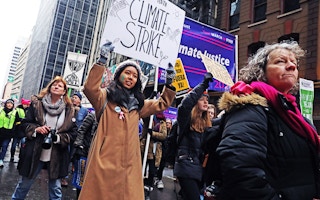Gender equality ranks bottom of a list of societal issues people worry about, according to a new study published on International Women’s Day.
To continue reading, subscribe to Eco‑Business.
There's something for everyone. We offer a range of subscription plans.
- Access our stories and receive our Insights Weekly newsletter with the free EB Member plan.
- Unlock unlimited access to our content and archive with EB Circle.
- Publish your content with EB Premium.
Healthcare, climate change, economic opportunity, poverty, food and water security, corruption, civil rights, and racial equality all outranked parity between the sexes in importance, the study of more than 8,000 people found.
While three-quarters of respondents (77 per cent) think that climate change is a serious issue, only 59 per cent of people view gender equality as seriously.
The study’s authors said they believe this shows a gap in understanding of how gender equality and climate change are connected, although younger respondents were more likely to believe that gender was a more serious issue than older generations.
Prior to the Ukraine invasion, a study by GlobalData found high concern for gender equality in Southeast Asia, particularly in the Philippines and Thailand, although concern for gender parity was lower than for environmental issues.

Younger people are more likely to regard gender equality as a serious than older age groups. Source: Team Lewis IWD report
“The struggle for gender equality has been ‘demoted’ by war, climate change, and Covid-19,” said Samuel Dean, chief executive of Team Lewis Foundation, a public relations firm that conducted the research in support of #HeForShe, a United Nations’ campaign for engaging men in support of gender equality.
“This research shows that people are overlooking gender equality,” he said.
The study of people in China, India, Singapore, United States, United Kingdom, Germany, Brazil, Mexico, Israel and the United Arab Emirates found that about half (49 per cent) of respondents believe that climate change affects the sexes equally, with female respondents (53 per cent) more likely to hold this view than men (44 per cent).
However, according to UN data, 80 per cent of the people displaced by climate change are women, including 70 per cent of the 1.3 billion people living in poverty.
The report finds that 72 per cent of men and 78 per cent of women believe that women should be included in government solutions for fighting climate change, although only 39 per cent of men and 44 per cent of women strongly agree that climate solutions are more effective if women are involved in policy decision-making.
A 2019 study found that more women in parliaments leads to more stringent climate policies, resulting in lower emissions, and yet less than 30 per cent of climate negotiators are women.
Angela Noronha, d is “a single war with multiple battlefronts” — such as gender, racism, and homophobia — and should not be confronted in isolation.
“Inclusion should be tackled in parallel with other issues, including climate change. When you have large swaths of the population acting with hands tied, or being told their futures are less promising, humanity’s pace of change slows down,” she said.
A study of global firms last year found that the greater the mix of gender, race and age on a company’s board, the more likely the firm is to take climate bolder action.
This story is part of our series on women to mark International Women’s Day 2022.












